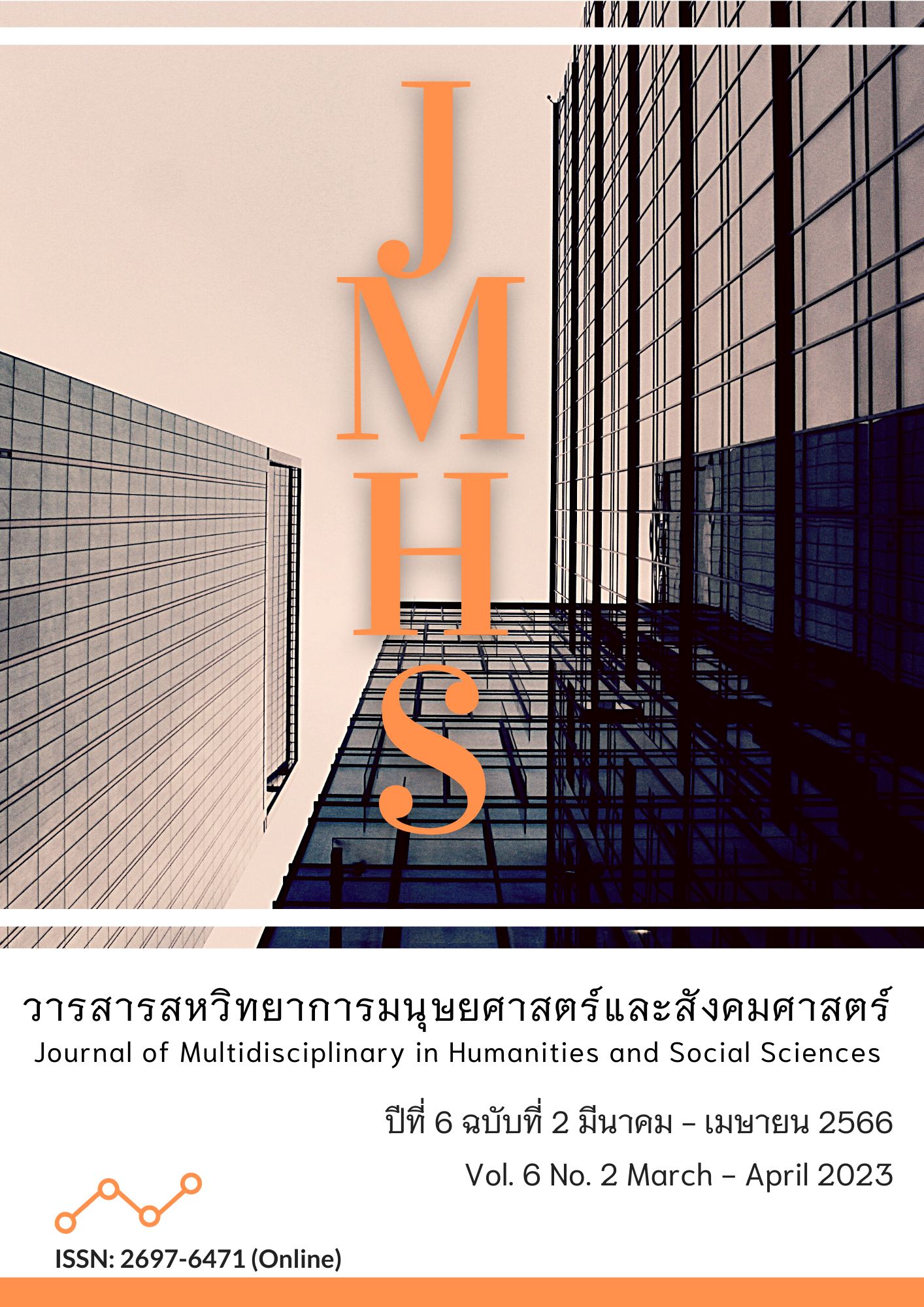Knowledge, Attitudes, and Practices about of Electronic Waste Management at Nong Rong Subdistrict, Phanom Thuan District, Kanchanaburi Province
Main Article Content
Abstract
The objectives of this article were to: 1) study the problems and obstacles of community electronic waste management; 2) study the levels of knowledge, attitudes, and practices about community electronic waste management; and 3) propose the promotion guidelines for electronic waste management in the community. This mixed methods research was conducted in Nong Rong Sub-district, Phanom Tuan District, Kanchanaburi Province. The sample group was made up of representatives from 400 households selected with cluster random sampling. Key informants were community leaders, officers from the Nong Rong-Sub-district Administrative Organization, and representatives of Nong Rong community members—9 people in total—who were selected with the purposive sampling method. Research tools included the questionnaire, semi-structured interview form, and fieldwork record form. Quantitative data were analyzed with descriptive statistics, and qualitative data were analyzed with content and descriptive analysis.
The research results revealed that there were three problems and obstacles to electronic waste management in the community: reduction of electronic waste in the community, reuse of electronic waste in the community, and recycling of the electronic waste in the community. Furthermore, the sample had high knowledge and attitude toward electronic waste management in the community. Meanwhile, they had a moderate practice of electronic waste management. In addition, three promotion guidelines for electronic waste management in the community were proposed: reduce electronic waste, reuse electronic waste, and recycle electronic waste.
Knowledge and findings from this research are the guidelines for behavior modification of community members on electronic waste management, and the information to determine the strategy and set the promotion plan for electronic waste in the community.
Article Details

This work is licensed under a Creative Commons Attribution-NonCommercial-NoDerivatives 4.0 International License.
Views and opinions appearing in the Journal it is the responsibility of the author of the article, and does not constitute the view and responsibility of the editorial team.
References
กรมควบคุมมลพิษ กระทรวงทรัพยากรธรรมชาติและสิ่งแวดล้อม. (2558). ยุทธศาสตร์การจัดการซากผลิตภัณฑ์เครื่องใช้ไฟฟ้าและอิเล็กทรอนิกส์เชิงบูรณาการ. สืบค้นเมื่อ 21 มีนาคม 2564, จาก http://infofile.pcd.go.th.
กรมควบคุมมลพิษ. (2562). รายงานสถานการณ์มลพิษของประเทศไทย ปี 2562. สืบค้นเมื่อ 21 มีนาคม 2564, จาก https://www.pcd.go.th/publication/10650
กระทรวงทรัพยากรธรรมชาติและสิ่งแวดล้อม. (2559). แผนยุทธศาสตร์กระทรวงทรัพยากรธรรมชาติและสิ่งแวดล้อม พ.ศ.2559. สืบค้นเมื่อ 21 มีนาคม 2564, จาก http://lib.mnre.go.th/lib/book/plan59-64.pdf
เจนจิรา เจนนุวัตร. (2562). มาตรการส่งเสริมการนำขยะอิเล็กทรอนิกส์กลับมาใช้ใหม่: ศึกษาเปรียบเทียบกฎหมายไทยกับกฎหมายของสหภาพยุโรปและประเทศญี่ปุ่น. วารสารบัณฑิตศึกษานิติศาสตร์, 12(3), 400-421.
ประทีป เลิศชัยประเสริฐ. (2556). กรีนไอซีทีเพื่อการจดัการขยะอิเล็กทรอนิกส์. วารสารการอาชีวะและเทคนิคศึกษา, 3(6), 63-74.
ปเนต มโนมัยวิบูลย์. (2558). แนวคิดในการจัดทำร่างกฎหมายจัดการซากผลิตภัณฑ์เครื่องใช้ไฟฟ้าและอิเล็กทรอนิกส์. เอกสารประกอบการเสวนาวิชาการ เรื่อง “ขยะอิเล็กทรอนิกส์: จัดการอย่างไรให้ปลอดภัย?. สถาบันวิจัยสภาวะแวดล้อม จุฬาลงกรณ์มหาวิทยาลัย.
นพวรรณ ธีระพันธ์เจริญ. (2550). ความรู้เรื่องสิ่งแวดล้อม. พระนครศรีอยุธยา: มหาวิทยาลัยราชภัฏพระนครศรีอยุธยา.
มนตรี รุ่งแสงมนูญ. (2555). มาตรการทางกฎหมายในการนำเข้าและการส่งออกขยะอิเล็กทรอนิกส์เพื่อหมุนเวียนกลับมาใช้ใหม่ (recycle) หรือการนำกลับมาใช้ใหม่ (recovery) หรือกำจัด (disposal) หรือใช้ซ้ำ (reuse) : กรณีศึกษาขยะอิเล็กทรอนิกส์จากคอมพิวเตอร์(วิทยานิพนธ์นิติศาสตร์มหาบัณฑิต). มหาวิทยาลัยธรรมศาสตร์.
สวรรยา ธรรมอภิพล, กรวรรณ ม่วงลับ และ นงลักณ์ สืบคาน. (2560). ความรู้ในการจัดการขยะอิเล็กทรอนิกส์ในครัวเรือนของชุมชนบ้านตลาดเขต จังหวัดกาญจนบุรี. Veridian E-Journal, Silpakorn University, 10(3), 1630-1641.
สุจิตรา วาสนาดำรงดี. (2558). สถานการณ์ปัญหาขยะอิเล็กทรอนิกส์. สืบค้นเมื่อ 21 มีนาคม 2564, จาก http://www.eric.chula.ac.th/download/ew58/ew_pocd.pdf
สุธิดา ภูกองชนะ. (2560). การศึกษาความตระหนักและแนวปฏิบัติในการเก็บรวบรวมและการคืนซากแบตเตอรี่โทรศัพท์มือถือในประเทศไทย(วิทยานิพนธ์วิศวกรรมศาสตรมหาบัณฑิต). มหาวิทยาลัยธรรมศาสตร์.
เสาวลักษณ์ กู้เจริญประสิทธิ์ และ สุมาลี พุ่มภิญโญ. (2560). ปัจจัยที่มีอิทธิพลต่อพฤติกรรมการจัดการขยะมูลฝอยของผู้ค้าหาบเร่แผงลอย เขตราชเทวี กรุงเทพมหานคร. วารสารมหาจุฬานาครทรรศน์, 9(2), 277-289.
Best, J.W., & Kahn, J.V. (2006). Research in Education. (10th ed.). Cape Town; Pearson Education.


